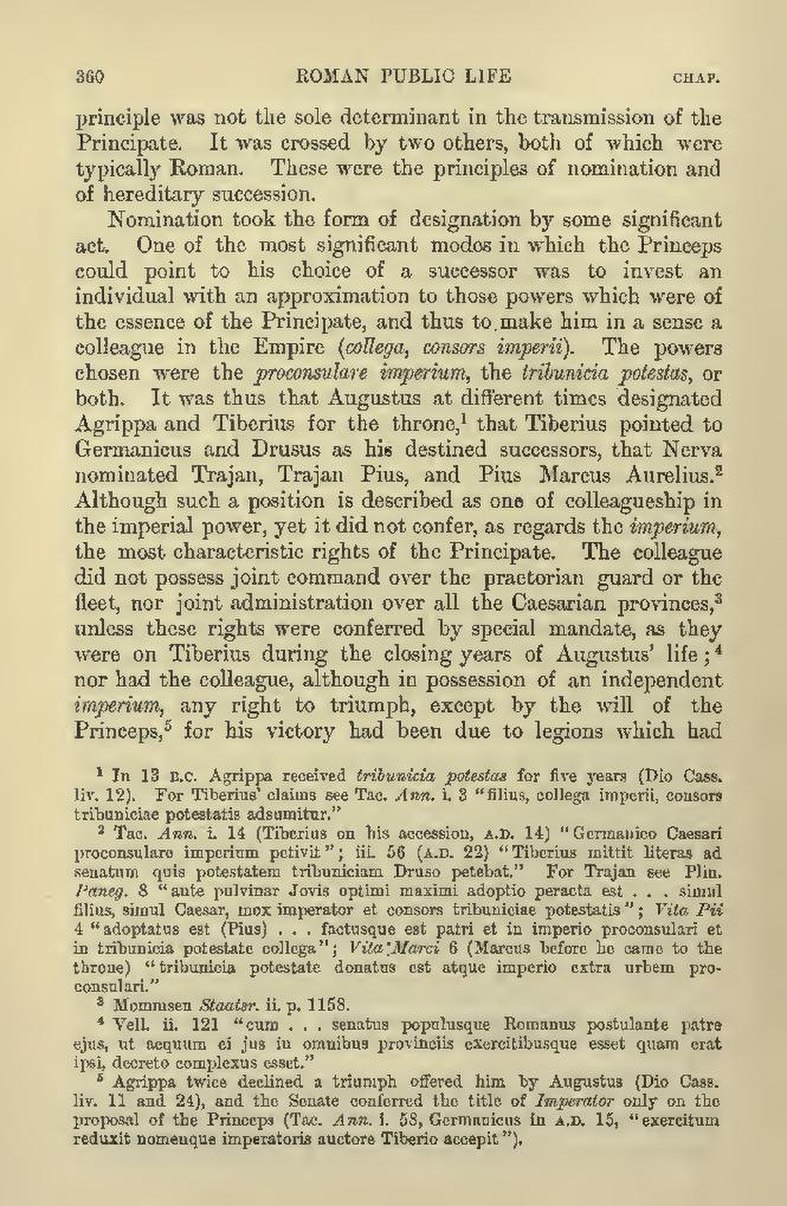principle was not the sole determinant in the transmission of the Principate. It was crossed by two others, both of which were typically Roman. These were the principles of nomination and of hereditary succession.
Nomination took the form of designation by some significant act. One of the most significant modes in which the Princeps could point to his choice of a successor was to invest an individual with an approximation to those powers which were of the essence of the Principate, and thus to make him in a sense a colleague in the Empire (collega, consors imperii). The powers chosen were the proconsulare imperium, the tribunicia potestas, or both. It was thus that Augustus at different times designated Agrippa and Tiberius for the throne,[1] that Tiberius pointed to Germanicus and Drusus as his destined successors, that Nerva nominated Trajan, Trajan Pius, and Pius Marcus Aurelius.[2] Although such a position is described as one of colleagueship in the imperial power, yet it did not confer, as regards the imperium, the most characteristic rights of the Principate. The colleague did not possess joint command over the praetorian guard or the fleet, nor joint administration over all the Caesarian provinces,[3] unless these rights were conferred by special mandate, as they were on Tiberius during the closing years of Augustus' life;[4] nor had the colleague, although in possession of an independent imperium, any right to triumph, except by the will of the Princeps,[5] for his victory had been due to legions which had
- ↑ In 13 B.C. Agrippa received tribunicia potestas for five years (Dio Cass. liv. 12). For Tiberius' claims see Tac. Ann. i 3 "filius, collega imperii, consors tribuniciae potestatis adsumitur."
- ↑ Tac. Ann. i 14 (Tiberius on his accession, A.D. 14) "Germanico Caesari proconsulare imperium petivit"; iii 56 (A.D. 22) "Tiberius mittit literas ad senatum quis potestatem tribuniciam Druso petebat." For Trajan see Plin. Paneg. 8 "ante pulvinar Jovis optimi maximi adoptio peracta est . . . simul filius, simul Caesar, mox imperator et consors tribuniciae potestatis"; Vita Pii 4 "adoptatus est (Pius) . . . factusque est patri et in imperio proconsulari et in tribunicia potestate collega"; Vita Marci 6 (Marcus before he came to the throne) "tribunicia potestate donatus est atque imperio extra urbem proconsulari."
- ↑ Mommsen Staatsr. ii. p. 1158.
- ↑ Vell. ii. 121 "cum . . . senatus populusque Romanus postulante patre ejus, ut aequum ei jus in omnibus provinciis exercitibusque esset quam erat ipsi, decreto complexus esset."
- ↑ Agrippa twice declined a triumph offered him by Augustus (Dio Cass. liv. 11 and 24), and the Senate conferred the title of Imperator only on the proposal of the Princeps (Tac. Ann. i. 58, Germanicus in A.D. 15, "exercitum reduxit nomenque imperatoris auctore Tiberio accepit").
